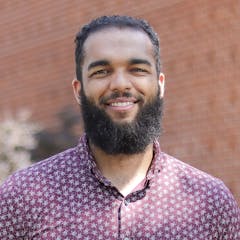Fighting for Life in ‘A Quiet Place’

Sound is deadly.
So you play monopoly with cloth pieces and roll the dice on carpet. Even the crunch of a leaf can be fatal, so you pour sand on paths to travel from one place to another. You learn sign language to communicate with children. You bow your head in prayer, hold your family’s hands, but no one raises their voice unto the Lord. You laugh on mute, cry on mute, cry out in pain on mute, sing on mute, live on mute — or you do not live at all.
This is the world in A Quiet Place (PG–13), the new thriller written and directed by John Krasinski who also plays the lead (Lee Abbott). His wife, actress Emily Blunt, plays his wife in the movie (Evelyn Abbott). The married couple fights to survive with their son and daughter as monsters lurk in the woods. For them, there is no such thing as safe and sound. The monsters can’t see them, but they can hear them. And if they can hear them, they will find them.
In such apocalyptic circumstances, the movie follows the Abbotts as they sneak through life, trying to do whatever they can to retain some semblance of a normal, albeit silent, existence.
A Quieter Place
But then the couple gets pregnant. And as parents know, no child comes quietly.
Yet, in this world of chilling, life-or-death silence, the Abbotts never even consider preventing a screaming, crying, fussing child from coming into the world. Surely this is a dire threat to the family security. Surely they could not bring the loud infant into their quiet place without risking everything. Surely this baby would get them all killed. Surely such circumstances made it more understandable for one to ponder one’s “reproductive rights” and opt to exercise one’s “reproductive freedom” to “terminate the pregnancy.”
If pregnancy was your reality in this silent world, and you had nine months to make the decision, would you invade the quiet place inside of her and snuff out the voice that would most likely get you killed? The Abbotts chose to silently say, “No.”
Death in a Quiet Place
Many in our society hear the same question and quickly, even casually, answer, “Yes.”
We kill our children daily by the thousands. No monsters prowl our woods, but they live in our homes. We have become them. We have turned forceps on those noisy creatures who would interrupt our plans, our comforts, our television shows. And if we know they have a disability — if they will be especially needy — we silence them at an even higher rate. We are the ones who attack the helpless in the quietest place, in their mother’s womb.
A Quiet Place is not properly a horror film, but it is extremely suspenseful and contains violent and frightening scenes. After an hour and a half, you can walk out of the theater and nobody really died. But the same is not true for the horror films taking place in abortion clinics across the U.S. and around the world — silent assassinations in sterile rooms. They wear white coats. They make death a business. They snatch children from deceived mothers, who tragically pay to have them taken away. We live in a society full of this movie’s monsters. And they seem so ordinary.
The Church in a Quiet Place
We not only attack those who have no voice, but we attack those who try to speak up for them. One cannot shriek too loudly on social media, in conversations around the dinner table, or in any civilized conversation about abortion. Polite society on this issue means a silent society. Hate that we plunge needles into baby skulls, suction out their brains, and bury them — not in a grave — but in a garbage can, and you too become a target. If we personally refuse to call evil good and good evil, put dark for light and sweet for bitter (Isaiah 5:20), then at least we better shut up about it.
Many Christians in the West have grown weary of being maligned on this issue. They have grown tired of doing good and speaking boldly for a taboo cause. Following Jesus is divisive enough without lending our voices to speak about what grieves and infuriates him. So, his body refuses to speak and we silence him too. And our mumbling of, “We didn’t know” doesn’t suffice.
If you faint in the day of adversity, your strength is small. Rescue those who are being taken away to death; hold back those who are stumbling to the slaughter. If you say, “Behold, we did not know this,” does not he who weighs the heart perceive it? Does not he who keeps watch over your soul know it, and will he not repay man according to his work? (Proverbs 24:10–12)
Many have fainted in this day of adversity. They are reduced to protest on mute, speak righteously on mute, be a kingdom of priests and a holy nation on mute — live Christianly on mute. They live on manicured lawns and must not make a sound while they putt our children into Sheol.
They have retired from the fight and live as good citizens in a quiet place — a quiet, civilized place that muffles its children indefinitely.
Sacrifice in a Quiet Place
This is not an endorsement of the movie — for we have enough violence and fright in real life that we do not need to escape into it. But at times, witnessing fictional terror can help us see the domesticated horrors that surround us every day — and the beauty of selfless love that rises to confront it.
Against all the loud, pink, pro-choice banners around us, A Quiet Place stands for human lives worth sacrificing for. Even when a baby would cost them everything, even when they had every excuse to declare their own rights, Lee and Evelyn Abbott fought for their family and their coming son. They risked their lives for their children. They exhausted every ounce of energy to protect them. I don’t know what John Krasinski wanted the world to know about unborn children, but in his movie, I witnessed God’s relentless, sacrificial, and beautiful love for the least and youngest of these.
And what was acted on screen in A Quiet Place was acted out by God in history. “To us a child is born, to us a son is given; and the government shall be upon his shoulder, and his name shall be called Wonderful Counselor, Mighty God, Everlasting Father, Prince of Peace” (Isaiah 9:6).
Jesus, an everlasting father to us, did not sacrifice his children but died for them. He laid his life down so that full pardon and full sonship would be secured for his blood-bought family. He gives former monsters (turned children) a new mind, a new heart, and a new courage to protect and fight for the most defenseless of his creation, hidden within a quiet place.




